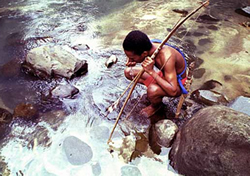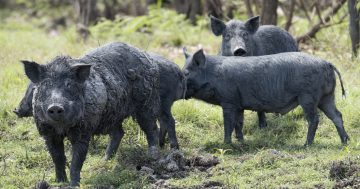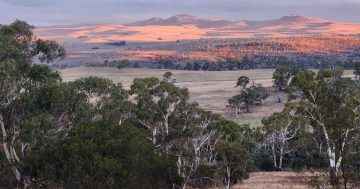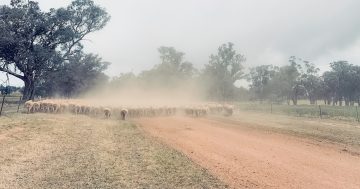Cathleen O’Grady* says new research suggests hunter-gathering was easier and healthier than farming, so how did modern agriculture catch on?
 For most of our history, humans got hold of food like any other animal: by hunting and foraging, moving around to find the best resources.
For most of our history, humans got hold of food like any other animal: by hunting and foraging, moving around to find the best resources.
Settling down in one place to cultivate crops is a comparatively recent development.
But once it started around 12,000 years ago, agriculture spread through human cultures across the world, fundamentally changing our societies, genomes, and possibly even languages.
In many ways, farming seems to have been terrible for the people who adopted it, leading to poorer nutrition and greater social inequality — but it also resulted in higher fertility rates and a massive population expansion.
Understanding how and why this technological change was adopted remains a challenge.
Studies mostly rely on fossil evidence, but there are also clues in the modern world, as some present-day groups of people are moving away from hunting, fishing, and gathering and toward agriculture.
A paper published in Nature Human Behaviour explores how this shift affects the time budgets of hunter-gatherers in the Philippines, finding that women who participate more in agricultural work have around half the leisure time of women who prioritise foraging.
The results fall in line with past research that challenges the concept of hunting and foraging as arduous work with scant rewards, and contributes to a growing understanding of the social dynamics that go along with a shift to agriculture.
A natural experiment
The Agta people in the Philippines have sustained their traditions of hunting, fishing, and foraging, preserving a huge body of knowledge.
Many of them trade some of their high-protein catch with local rice farmers, getting high-calorie carbs in return.
But some Agta people also spend some of their time working on local rice farms instead of foraging, which makes it possible to explore the consequences of a shift to farming in real time.
Of course, this is not a perfect proxy for the change that people would have experienced 10,000 or 5,000 years ago.
The Agta are modern people who have been living alongside agriculturalists in an industrialising country for a long time.
Also, the agricultural techniques available to the Agta are a world apart from the sort of farming that was being developed millennia ago.
The social and political dynamics playing out between Agta and other Filipino populations are also going to be distinct from those of societies that managed this transition in the past.
With those caveats in mind, researchers gathered data on how Agta spent their time each day for months.
Every day, they’d scan 359 people living across 10 camps and find out what they were up to.
Budgeting time
The results sketch out how sex and age make a difference to people’s time budgets.
Beginning in adolescence, women and men both start spending more time on domestic chores, childcare, and “out-of-camp” work, which can include hunting, foraging, and agricultural work.
For men, more of that time goes on out-of-camp work; for women, more goes on childcare and domestic work, but there’s some of each in the mix for everyone.
Around the same time, leisure time takes a nosedive and doesn’t pick up again until middle age.
There were huge differences in the amount of agricultural work that people did — some did none, and for others, it was as high as 80 per cent of their out-of-camp time.
It’s not well understood why people make such different choices, says Abigail Page, one of the authors of the paper.
Some camps are closer to rice farms than others, but camp membership is fluid among the Agta, and they’re able to move from one to another when they choose.
For some Agta, preserving their culture and identity is central.
But for others, farming is seen as higher-status, and some Agta mothers “talk about their desire to have kids that are educated and healthy,” says Page.
Unfortunately, for Agta people, the transition to farming comes with worse health and higher infant mortality.
This research also shows leisure time takes a knock: women who engaged more in agriculture spent more time working out of camp, didn’t reduce their domestic load, and thus had less leisure time.
“The transition away from foraging,” the researchers write, comes along with “a deteriorated standard of living.”
Time affluence
From the 1960s onward, anthropologists began to shift how they talked about hunter-gatherers.
While they had previously been seen as living precarious lives filled with hardship, anthropologist Marshall Sahlins argued that their lifestyle was, in fact, one of abundance.
They desired little, he argued, and their essential needs were met easily, allowing a workweek of just 12 hours in what Sahlins called the “original affluent society.”
This framing has been challenged; Sahlins’ framework omitted domestic chores and food processing, hardships caused by natural disasters and other changes in resource availability.
Still, it does seem to be true that moving away from foraging and toward farming goes along with poorer health and a lower standard of living — both for modern hunter-gatherers and for our Neolithic ancestors.
Why, then, did farming catch on?
The best explanation may involve calories and fertility: the readily available carbs of farmed cereals can make a huge difference to how many children a woman has, which makes it a strategy favoured by the cold hard math of evolution.
Our modern view of hunter-gatherers gets stuck between “the naturalistic fallacy of everything they do being good” and a view that assumes their lives are “short and brutal,” says Page.
The reality is more complicated.
Even in a very marginal environment, people are still able to live a hunter-gatherer lifestyle and have a good amount of leisure time.
Farming may bring them some advantages, but it shouldn’t be assumed to mean uncomplicated “progress.”
“We tend to like using hunter-gatherers to reflect on our own nature,” says Page.
Correlational data like this, based on one group of people, has its limitations, but it’s useful in understanding how prestige and fertility may have played a role in the spread of agriculture.
* Cathleen O’Grady is Ars Technica’s contributing science reporter. She tweets at @cathleenogrady.
This article first appeared at arstechnica.com











